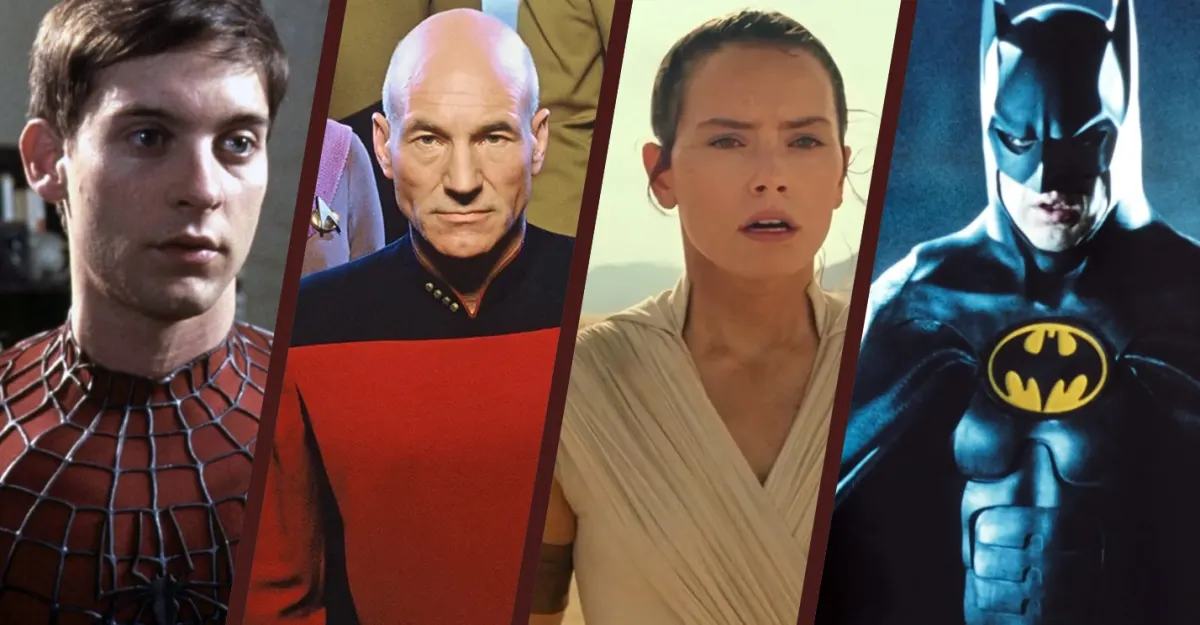I am a fan.
I don’t normally write these pieces in the first person, because I should be the least interesting part of anything I write about, but I feel like it’s important to acknowledge that up front. I can write (and have written) millions of words about how much I love Star Trek. I can talk (and have talked) for hours about my relationship to Star Wars. I could compose (and have published) books on The X-Files. All of this is to say that I am a fan. And few words scare me as profoundly as “for the fans.”
Fans have always been a part of mass media franchises. David Gerrold was a fan of the first season of Star Trek who went on to write maybe the single best episode of the following season. Many early Star Trek novels were written by ascended fans like Vonda N. McIntyre or Melinda Snodgrass. The writing staffs of later Star Trek spin-offs were populated by ascended fans like Ira Steven Behr, Ronald D. Moore, René Echevarria, and Naren Shankar.
For all that certain commentators throw around “fan fiction” as a pejorative term, virtually every major long-running franchise is essentially corporate-sanctioned fan fiction at this point, regardless of quality. There’s not necessarily anything wrong with that. Historically, these sorts of ascended fan voices have added and enriched the properties for which they were writing, exploring nooks and crannies in the established mythology that helped to flesh out the world.
The Enterprise’s navigation officer, Sulu (George Takei), didn’t get a first name until McIntyre thought to give him one in the novel The Entropy Effect. It would subsequently be ported over to canon. Many of the fans writing Star Trek novels like Snodgrass gravitated towards the character of Uhura (Nichelle Nichols), because she had been “under-utilized” on the show itself. Moore’s first script for Star Trek: The Next Generation was essentially a deconstruction of the classic “red shirt” trope.

More generally, this fan-creator culture carved out space for fans who hadn’t previously seen themselves reflected in the media itself. Gerrold is a gay man who tried desperately to write the franchise’s first episode to feature two gay characters. Fan spaces frequently made room for the voices of women, people of color, and queer people that made the franchise bigger rather than smaller. They often expanded the scope of what Star Trek or Star Wars or Doctor Who could be.
All of this is to illustrate that fans can help these franchises grow and develop in interesting ways, if they’re willing to really think about the source material. Most of the writing staff of Star Trek: Deep Space Nine were huge Star Trek fans who routinely tried to sneak fun references into the show. However, they were also working on a show that radically and dramatically redefined what Star Trek could be.
And yet there’s something chilling about the idea of a piece of mass media existing “for the fans.” The language pops up frequently in press interviews. Director Jason Reitman promised that Ghostbusters: Afterlife would “hand the movie back to the fans.” Editor Maryann Brandon boasted of The Rise of Skywalker, “Look, sure, it’s fan service.” Justice League composer Danny Elfman recalls Joss Whedon telling him to recycle music cues from older films because “fans love this kind of stuff.”
There are essentially three interlinked problems with this appeal that mass media should be “for the fans.” The first and most obvious is that it feels like obvious pandering. If something is good, it should be able to argue for itself on its own merits instead of appealing directly to the fans. After all, nobody tuned into the first episode of Star Trek on NBC because they were already Star Trek fans. These franchises won audiences over by telling compelling stories.

The second problem is one of tribalism. As mass media ownership has become increasingly consolidated (and perhaps as discourse has become increasingly polarized) the idea of “fandom” has become one of identity. A criticism of a piece of intellectual property (or even the corporate owner of a piece of intellectual property) is seen as a personal affront. Something like Martin Scorsese’s criticism of the current economic climate for filmmakers becomes a weird rallying cry.
Most fans are great. Most fans go about their daily lives like normal people who, to quote two of our greatest pop culture philosophers, just like to be excellent to each other. However, there is also a consistent pattern of behavior among the more vocal modern fans that is unsettling to say the least. Fandom becomes an identity, so these extreme and belligerent voices target critics that don’t agree with them, fandoms of rival properties, and even actors who appear in movies they dislike.
As somebody who comments regularly on pop culture, I can tell you that this attitude is not unique to one fandom. It doesn’t matter how big or how small a property is; it doesn’t matter whether it’s critically loved or critically reviled; it doesn’t matter if it makes a billion dollars or crashes on opening Friday. The properties I like suffer from this, as do the ones I hate. All fandoms have a vocal minority who are just loud enough to ruin the fun for everybody else who is just trying to have a good time.
Making movies “for the fans” implies a sense of ownership that furthers this tribalism. The phrase suggests that these movies are intended for a certain subset of the audience to fight over, to defend, to protect. There is an unspoken “not for everyone” appended to the statement. It also implies that, given this particular iteration of the property is “for the fans,” other versions were not and that anybody who happened to enjoy those installments is “not a real fan” and so is “the enemy.”

This perhaps gets at the third and most significant problem with pitching media as something primarily “for the fans.” It is inherently regressive. Fans are fans based on things that already exist and are already part of the overall property. Servicing fans prioritizes attempts to emulate what fans already love, trying to recreate a high that is often filtered through the lens of childhood nostalgia. It’s an attempt to photocopy the Mona Lisa and call it a masterpiece.
If somebody wants to see the Mona Lisa, perhaps they should just go and see the Mona Lisa. If somebody wants a version of Star Trek that is exactly like the third through sixth seasons of Star Trek: The Next Generation, perhaps the best thing to do is to rewatch the third through sixth season of Star Trek: The Next Generation. At their best, these sorts of “for the fans” projects exist in a weird uncanny valley, like watching an exotic animal put on display in a petting zoo.
The point of the petting zoo isn’t to satisfy the animals. If fans want more Tim Burton and Michael Keaton Batman, why not give Burton $200M and the creative freedom that he enjoyed on Batman and Batman Returns? If people are so eager to see the return of Sam Raimi and Tobey Maguire’s Spider-Man, why not write Raimi a check and get out of his way? Hell, if fans want to see Marc Webb and Andrew Garfield’s Amazing Spider-Man “redeemed,” why not give them that chance?
The truth is perhaps that studios understand that “for the fans” is code for wanting a reminder of the thing, not the thing itself. Letting Burton make another Batman movie might force fans to acknowledge that his films were bold and ambitious departures from what had come before. Letting Webb make another Amazing Spider-Man movie runs the risk of reminding fans that maybe they didn’t actually care for the reality of the previous two movies so much as the nostalgic reassurance that they have ownership of it.

Fans can be honest about the aesthetic conservatism of fandom. There are few bigger Star Trek fans than the writers of Deep Space Nine, and they poured their hearts and souls into making the best version of Star Trek that they could. However, the show was not popular at the time among hardcore Star Trek fans. “I just thought they were very conservative; they want the same thing,” Behr has explained. “They don’t want new; they want the same old shit that makes them feel good.”
The Next Generation faced similar problems. Moore recalls, “You would go to conventions and there would be bumper stickers and T-shirts that basically said, ‘I’m a real Trekker. Forget the bald guy.’” Actor Marina Sirtis remembers, “Fans hated the fact that we were on.” However, history has been kind to both The Next Generation and Deep Space Nine. Although neither show was “for the fans,” the fandom eventually (sometimes decades later) expanded to include them.
Incidentally, I am a fan of both The Next Generation and Deep Space Nine. I was also a fan on original airing. I am a fan of them because they are great pieces of television. I don’t need more media to tell me that I am special or important because I happen to like a particular thing. I have enough interest outside myself to be curious about what other people have to say with and about the things that I love. Maybe I’ll like it; maybe I won’t. Either way, I’ll still always have my Next Generation Blu-rays and Deep Space Nine DVDs.
The things that we love need to be able to grow and change, to evolve and develop. They can’t (and shouldn’t) stay stagnant, trying to offer unconvincing simulacra derived from some vague collective memory. Maybe the best thing “for the fans” would be for us all to be a little more open-minded.






Published: Dec 22, 2021 11:00 am